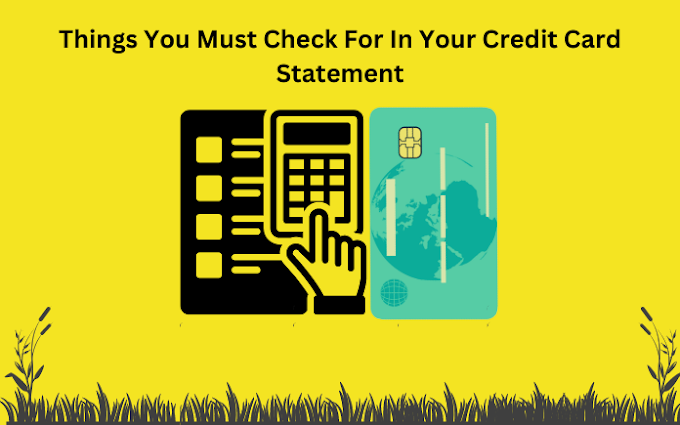Things You Must Check For In Your Credit Card Statement
Credit cards are a fantastic source of money. They enable you to improve and raise your credit score in addition to providing you with financial flexibility. Additionally, each time you use your card for an eligible purchase, you earn cashback, points, or air miles. The use of your low-interest credit card for a billing period is listed in summary form. When it comes to reading credit card statements, understand how challenging it can be. Your overall credit card balance is calculated using a variety of terms, figures, credit card statements, and percentages.

Observations regarding your credit card statement
When using a credit card, it's essential to
understand the declaration you receive at the end of your billing period. The
following things to check on your credit card statement are
The Availability of credit limits
A credit card's limit is determined by several
variables. If you have never used the facility, your credit limit will be
reduced. This limit is set by the bank, and the cardholder is not allowed to go
over it. Depending on the policies and conditions, some providers allow
customers to exceed the limit. To avoid debt traps, banks usually advise
sticking to their limit.
Due Date for Payment
The payment due date is one of the most
significant items to look for on your credit card bill statement. You have to
pay your fees by that date. However, it may not be a good idea to pay on the
last day before the payment is due. If you pay by check, it could take up to
three business days for the payment to be processed, going to charge you late
payment fees and interest. Therefore, you need to confirm the payment due date
and send it as soon as you can.
Minimum due amount
If you appear unable to pay the full amount
due, the card issuers will permit you to pay a small sum to avoid the late
payment fee. With all credit card companies, you have the option to pay a
smaller amount each month rather than the full amount due.
This amount is typically small compared to the
total amount due because it only accounts for 3% to 5% of the total. If you are
unable to pay the entire amount due and want to stop falling behind on your
payments, minimum payment should only be made as a last resort.
Banking fees
You might wonder from time to time how your
credit card bill ended up being higher than you expected. This might happen as
a result of certain bank fees, like interest rates, late payment fees, cash
advance fees, and others. So be careful to avoid these extra bank fees.
Cashback or Points for Rewards
Credit card users can benefit from some
cashback or bonus point offers that come with each credit card on or almost all
of their purchases. Your statement also includes a total of the cash back or
reward points earned during a billing cycle. So that you can use your reward
points for accurate results before they expire, you can keep track of your
reward cards and their validity.
Conclusion
A credit card statement is a detailed account
of every transaction you made during a specific period. Along with your account
balance, statement balance, required minimum payment, and due date, it also
shows any payments, credits, interest, and fees you accrued during that period.
Your credit card company sends you a statement once a month, right after your
billing cycle is over.
Read More: How To Choose The Best Credit Card For Your Needs



Comments
Post a Comment